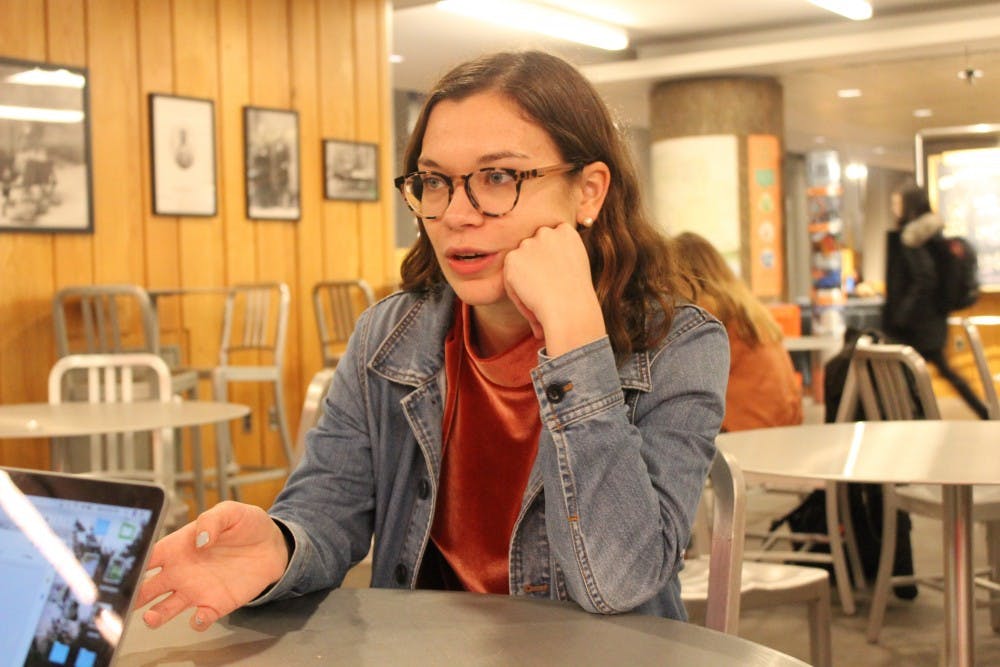Known for her intellect and caring nature, Annabel Barry ’19 was recently named a George J. Mitchell Scholar, an award only given to 12 scholars nationwide out of 370 applicants. The 12 scholars will spend a year of postgraduate study at institutions of higher education in Ireland.
Barry, an English major who is pursuing certificates in European cultural studies, humanistic studies, and theater, plans to pursue a master’s degree in philosophy and literature at the University College Dublin (UCD) next fall.
In her first year at the University, Barry struggled with the Humanities sequence, an intensive year-long introduction to the Western tradition, receiving poor grades on her first three papers. However, one of her graders, French and Italian professor Simone Marchesi, then suggested that she write her next draft without any adjectives or metaphors.
“[That experience] was incredibly painful, but [it] taught me so much,” Barry said. “I am forever indebted.”
Marchesi attributed Barry’s desire for success as the root of her strong academic writing. He said that the help he gave was small in comparison to her hard work.
“The gift our best students have … [is] not so much the ability to get things right the first time, but the commitment to use the advice they receive and grow,” Marchesi said.
One of Barry’s most formative experiences was when she was named the Princeton Bread Loaf Fellow at the University of Oxford. At Oxford, she took a class on James Joyce, the author of “Ulysses,” while pursuing independent research.
Her experience reading “Ulysses” under Jeri Johnson, the editor of the novel’s Oxford edition, was the highlight of her summer, Barry recalled. She explained that the book stood out to her more than any other book had.

“I would start thinking about the complexities of “Ulysses” and end up getting these headaches from thinking about the complexities,” said Barry.
Comparative literature professor Sandra Bermann, who taught COM 335: Poetries of Resistance praised Barry’s creativity.
“Barry … makes you rethink texts you’ve read a hundred times before,” she said.
Bermann recalled that Barry’s final paper crossed the literary borders that usually separate memoir, poetry, prayer, and critical reading.

In fact, Barry’s writing aptitude was so impressive that her thesis advisor, English professor Susan Wolfson, referred Barry’s 16-page essay, “‘My brother Tom is much improved’: The suffering body in Keats’ poetry” to an editor of “The Keats-Shelley Review,” who was impressed. Barry’s essay was accepted for publication soon after she submitted it.
Barry had written the essay in spring 2018 for Wolfson’s seminar, ENG 341: The Later Romantics.
“The essay was such an accomplishment of critical insight and writerly craft,” Wolfson said.
Barry’s peers and friends share the same degree of respect that her professors have for her.
Her lifelong friend from home, Julia Durstzman, emphasized that Barry’s commitment to authenticity is seen in each set built in the theater program, essay written, and friendship built.
“She gives a piece of herself to every work she creates,” Durstzman said.
Sylvie Thode ’20 stressed that Barry’s contribution to those around her is even more valuable than her profound literary commitment. Thode explained that, as one of Barry’s friends, she is “so lucky” to have witnessed Barry’s deep care that she devotes to those around her.
“As soon as Annabel starts talking … you can tell she’s brilliant,” noted Jasmine Wang ’18, who was in the same precept as Barry in COM 335. “She is one of the brightest and best people at Princeton and is so empathetic — she does good for this world.”
Barry hopes to do good in both her personal and academic pursuits.
For instance, her theater thesis, a community theater project of “The Odyssey: The Musical,” works with numerous community groups in Mercer County, including the Trenton Circus Squad and Trenton Children's Chorus. The project leads multiple scenery workshops with Homefront New Jersey, an organization which aims to end homelessness, that connects the University’s community with the broader township.
She intends to continue this project at UCD, noting the college’s commitment to advocacy and activism.
Prior to this scholarship, Barry has received numerous academic awards from the University. For instance, Barry was awarded the Class of 1883 English Prize for Academic Freshmen, the Frances Biddle Sophomore Prize for the best English literature essay of the year, and the George B. Wood Legacy Junior Prize, which recognizes one student of the senior class for his or her academic achievement during the junior year.








